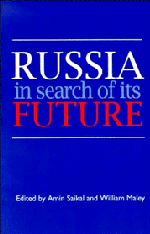Book contents
- Frontmatter
- Contents
- Preface
- Notes on Transliteration
- 1 Introduction
- Politics
- Economics
- International Relations
- Culture and Society
- 10 Culture in Russia and Russian Culture
- 11 Reconstruction, Deconstruction and the Restoration of Literature in Russia
- 12 Alternative Visions of the Russian Future
- Conclusion
- Notes on contributors
- Index
10 - Culture in Russia and Russian Culture
Published online by Cambridge University Press: 03 May 2011
- Frontmatter
- Contents
- Preface
- Notes on Transliteration
- 1 Introduction
- Politics
- Economics
- International Relations
- Culture and Society
- 10 Culture in Russia and Russian Culture
- 11 Reconstruction, Deconstruction and the Restoration of Literature in Russia
- 12 Alternative Visions of the Russian Future
- Conclusion
- Notes on contributors
- Index
Summary
The word ‘culture’–undoubtedly one of the most important words in modern European languages, including Russian–is also, to cite Professor T.H. Rigby's phrase, ‘in wide, if inconsistent use among social scientists and historians’. For the purposes of this chapter, I distinguish at least three meanings which are nowadays more often attached to this word in scholarly discourse. These three meanings are different enough among themselves, but also in many ways interconnected; therefore they may be intentionally mixed or unintentionally confused.
Strangely enough–or perhaps, on the contrary, naturally Enough–standard dictionaries of the English language do not adequately reflect or register all the meanings of the word ‘culture’ that I am going to define and use. It is only as my starting point that I can take one of the definitions in the Oxford English Dictionary. ‘The training, development, and refinement of mind, tastes, and manners; the condition of being thus trained and refined; the intellectual side of civilization’. In this chapter I will but rarely use the word ’culture’ as defined in the first two parts of this definition. The third part, rather opposed to the rest, is more important for my purposes, but also the least satisfying and accurate.
- Type
- Chapter
- Information
- Russia in Search of its Future , pp. 158 - 177Publisher: Cambridge University PressPrint publication year: 1994



